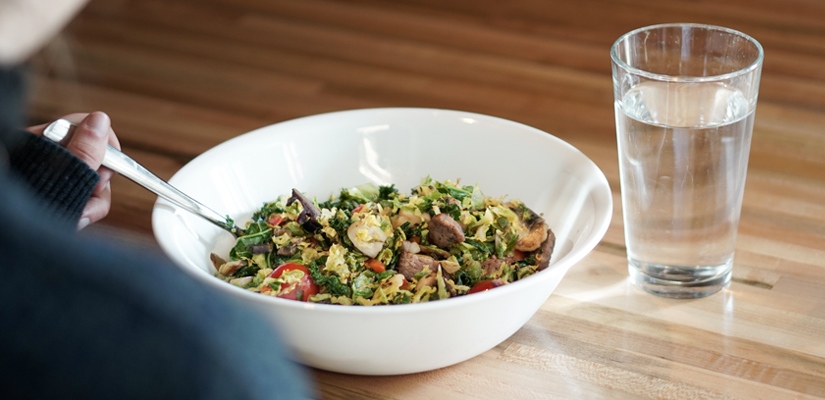Rest Week Nutrition: What to Eat to Recover

Everything you do in a recovery week should help you get faster. Your nutrition is no exception. Intentional choices around nutrition can improve the efficacy of your recovery and leave you feeling stronger than ever for the next block of training.
For more information on nutrition and recovery check out Ask A Cycling Coach Ep 242
The Recovery Week
Recovery weeks are an essential part of any structured training plan. The workouts and rest days are designed to give your body a chance to recover from the training stress accrued over several weeks of hard training. The recovery process doesn’t just end with the workouts on your Calendar though. How you choose to aid your recovery through fuel is equally important.
Nutrition during a recovery week isn’t always intuitive though. You might be wondering if you should decrease consumption in correspondence to the lower workload. Or maybe now that your workload isn’t so demanding now is your time to let loose and eat whatever you want! While the best solution is different for everyone, often the answer lies somewhere in between.
Eat to Aid Recovery
During your training weeks, you eat to fuel your workouts. During your recovery weeks, you eat to fuel your body’s recovery process. Your primary goal during your recovery week is to eat enough nutritious food to properly fuel your body’s recovery. What, when, and how much you eat will vary depending on your physiology and the level of fatigue you are experiencing going into your recovery week. If you come into your recovery week with excessive fatigue you might be eating more. If you are feeling a normal level of fatigue your eating habits may not change at all.
Ideally, during this week you are eating nutritious whole foods that fill you up and don’t leave you hungry. Your body is healing and adapting in response to the stress of training. It’s your job to make sure you have enough good fuel to do so. If you don’t fuel this process properly you won’t be cashing in on all the hard work you’ve put in the bank. That being said, while this might be a very important process you actually have a little more leeway than you might think when it comes to what you eat.
Mental Rest and Nutrition
Eating to aid recovery doesn’t have to mean eating perfect “healthy” meals every day. Just like the workouts in your recovery week give you a mental break so can your diet. Because the workouts in your plan are not nearly as demanding, you have much more leeway during a recovery week with nutrition. This means you can give yourself additional mental rest during a recovery week by taking a break from strict eating. For many athletes getting enough mental rest is as important as getting enough physical rest.
This week is an opportunity to ease up on your diet and maybe even indulge in a few of your favorite meals. Thinking less about food and allowing yourself to eat meals that are off-limits during regular training weeks is a great way to give your brain a little bit of extra vacation.
The quality of your food should correspond to the quality of your workouts. Demanding interval workouts require higher quality and intentional food choices than recovery workouts. With that, you don’t have to worry about being quite as strict about what you eat, as long as you are getting enough of it.
Choosing to eat some fun meals and ease up on your diet can help prevent binging and lapse in diet during build weeks. Keep your eating habits during your recovery week at a level that allows you to nail your training and nutrition during your regular training progression.
Don’t Restrict Calories
Because your weekly TSS is lower, now might seem like a good time to cut calories. In reality, restricting your diet and cutting calories can hinder the productivity of your recovery. This in turn can affect the beginning of your next training block. Depending on your level of fatigue you may not eat as much as you would in a normal training week, so cutting down could happen naturally, but it’s best not to make intentional harsh dietary restrictions.
If you’re worried about your body composition remember that positive changes in body composition don’t take place in one week. These changes happen over prolonged periods of time. Make decisions around nutrition that have a positive impact on the efficacy of your training progression rather than your weight. This investment in your training plan and your workouts will have a greater impact on body composition in the long run than cutting calories in one week might. Aiding your recovery and giving your body the sustenance it needs to mend itself after a hard training block
With that said, every athlete is different and dieting not only takes many shapes and forms but impacts different athletes in different ways. If you choose to diet on recovery weeks pay attention to your body’s physical response to the workouts you complete and use your own discretion.
Look Ahead!
The choices made during your recovery week can have an impact on the long term progression of your training plan. Your nutrition should move your goals forward, improve your mental stamina and assist your body’s recovery process. Choosing nutrition that reinforces growth and recovery is an investment in all the hard work you completed during your training block.
For more cycling training knowledge, listen to the Ask a Cycling Coach — the only podcast dedicated to making you a faster cyclist. New episodes are released weekly.
